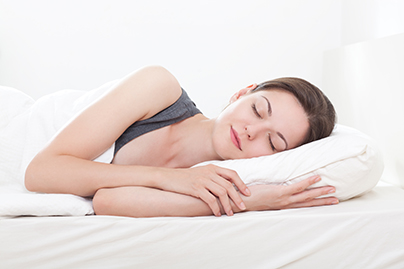Sleep has a large impact on the quality of health and the risk of chronic diseases, and conversely, with the rise in chronic diseases comes a rise in the number of patients suffering from poor sleep.

Sleep disorders, such as insomnia and sleep apnea, can be successfully treated with a Nutritarian diet, exercise, and proper sleep hygiene.
Complaints of insomnia and poor sleep are one of the most common reasons for patients to visit their physician. In 2010, there were 5.5 million office visits for insomnia and 5.8 millions visits for sleep apnea.1 As the U.S. continues to suffer from the obesity epidemic and the chronic diseases that accompany it, patients will continue to suffer from poor sleep quality. Poor sleep leads to diseases such as hypertension, heart disease, mood disorders, and addictions, such as drugs and alcohol abuse.
Sleep is essential for proper immune function, detoxification, metabolism, and many other functions. Conventional medicine often treats sleep disorders with hypnotics, which carry the risk of many adverse effects. Medications do no treat the root of the problem. When the body is optimized with a Nutritarian diet, correction of nutritional deficiencies, exercise, appropriate light exposure and proper sleep hygiene, the typical result is a lean body, reversal of chronic diseases, and an increase in quality and quantity of sleep.
The following are sample questions from the Ask the Doctor Community Platinum and higher members can post their health questions directly to Dr. Fuhrman. (All members can browse questions and answers.)
I am a 38-year-old male with no known health issues, except insomnia. I am mentally tired during the day from not sleeping well at night. I exercise nearly every day and generally am a very happy person. I am 6’3”, 180 pounds. I work in front of a computer all day and also at night when I get home. Could this be keeping me up? What else could it be?
You may have success incorporating this into your routine:
What is the cause and cure of sleep apnea?
It is related to a toxic diet and being overweight. You need to get yourself in great health at a healthy (thin) weight, and your sleep apnea can resolve. We see symptoms of sleep apnea improve with weight loss and nutritional excellence.
My teenage son has been suffering from insomnia for a couple months now. Living in the college dorms has made it worse. He is having a hard time functioning during the day because he is so tired. Do you have any suggestions?
He should learn how to meditate and truly relax and rest without even trying to sleep.
His diet needs to be better; he should take the typical supplements recommended and maybe try some of the herbal sleep aids, but overall, this is a problem likely exacerbated from stress and fear of not sleeping, and he has to get out of that cycle by learning how to get into a relaxation trance that is almost as good as sleeping. When he can be taught and convinced about totally relaxing his body and mind, he will eventually be able to sleep better again.
Also, morning sunlight, more outdoor activities, and more exercise can help.

Laura didn't want to die young and lost 88 pounds, reversed her diabetes and depression, now feels better than ever... Read More
Results may vary.

Gaylynn lost 79 pounds, is free of high blood pressure and sleep apnea, her husband lost 60 pounds and his high blood pressure is also gone... Read More
Results may vary.

Kathleen lost 48 pounds she had gained after being diagnosed with a rare autoimmune disease and eliminated most of her medications... Read More
Results may vary.

Over years following Eat To Live, Amber has had many health benefits including no more migraines, insomnia or acne and lost 35 pregnancy weight gain... Read More
Results may vary.